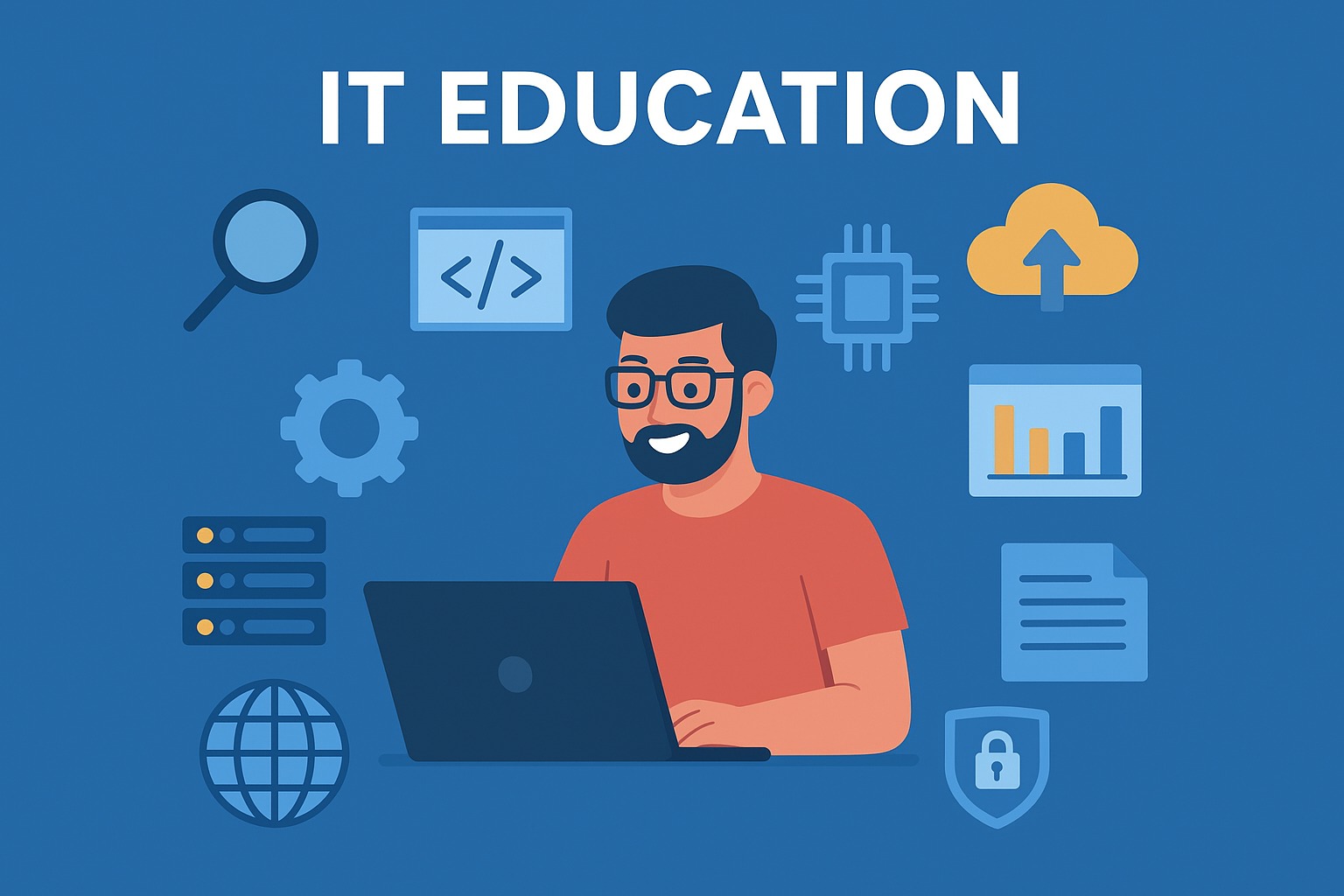IT Education: The Complete Guide to Skills, Careers, and Future Opportunities
Introduction
In today’s digital-first world, Information Technology education has become one of the most powerful drivers of personal growth, career success, and global innovation. Whether it’s artificial intelligence, cybersecurity, cloud computing, or data science, IT skills are shaping the way industries function and individuals work.
With the rise of digital transformation, every company — from small startups to global enterprises — needs skilled IT professionals. This has made IT education not just an option, but a necessity for students, working professionals, and entrepreneurs alike.
In this blog, we’ll explore everything about IT education: its meaning, importance, popular courses, career opportunities, challenges, future trends, and practical tips for learners.
What is IT Education?
IT Education refers to structured learning programs designed to provide knowledge and skills in computing, programming, networking, software, data, and emerging technologies. It can include:
-
Formal Education: Degree programs like B.Tech in Computer Science, BCA, MCA, or M.Tech.
-
Short-Term Courses: Certifications in Python, Java, Cloud Computing, or Cybersecurity.
-
Bootcamps: Fast-track programs focused on employable IT skills.
-
Online Platforms: MOOCs (Coursera, Udemy, edX) offering flexible learning.
-
Corporate Training: Upskilling sessions for professionals in industries.
Why IT Education Matters Today
1. High Demand for IT Professionals
From software engineers to data scientists, the job market is overflowing with opportunities for skilled IT professionals.
2. Digital Transformation of Businesses
Banking, healthcare, retail, logistics, and even agriculture are adopting IT tools for automation, analytics, and customer engagement.
3. Global Career Opportunities
IT education allows individuals to work remotely, freelance globally, or join multinational corporations.
4. Entrepreneurship & Innovation
Startups and tech-driven ventures are growing rapidly. A strong IT foundation gives future entrepreneurs the ability to build scalable solutions.
5. Lifelong Relevance
As technology continues to evolve, IT education ensures lifelong adaptability and employability.
Popular IT Education Pathways
There are multiple ways to pursue IT education depending on career goals:
1. Undergraduate & Postgraduate Degrees
-
B.Tech / B.E. in Computer Science
-
BCA (Bachelor of Computer Applications)
-
MCA (Master of Computer Applications)
-
M.Tech / M.Sc. in IT or Data Science
2. Diploma & Certificate Programs
Short-term skill-based programs in:
-
Programming Languages (Python, Java, C++)
-
Web Development (Full Stack)
-
Cloud Computing (AWS, Azure, GCP)
-
Cybersecurity and Ethical Hacking
3. Bootcamps
Intensive 3- to 6-month courses focusing on practical, job-ready skills.
4. Online Courses (MOOCs)
Coursera, Udemy, edX, and LinkedIn Learning offer flexible online learning options with global certification.
Core Subjects
-
Data Structures & Algorithms
-
Programming Languages (Python, Java, C++)
-
Database Management Systems
-
Computer Networks
-
Software Engineering
-
Cloud Computing & DevOps
-
Data Science & AI
-
Cybersecurity
-
UI/UX Design
Future Trends
1. AI-Powered Learning
Personalized courses and AI tutors are making IT education more efficient.

2. Immersive Technologies (AR/VR)
Virtual reality labs and simulations for coding and networking training.
3. Blended Learning Models
Mix of online and classroom-based learning is becoming the norm.
4. Lifelong Learning
Continuous upskilling through micro-courses and certifications.
5. Industry-Academia Collaboration
Closer ties between universities and tech companies to ensure employability.
Career Opportunities
1. Software Development
Build applications, platforms, and enterprise solutions.
2. Data Science & Analytics
Work with big data, machine learning, and AI models.
3. Cybersecurity
Protect organizations from digital threats and cybercrime.
4. Cloud Computing
Design and manage cloud-based infrastructure.
5. Web & Mobile App Development
Create digital platforms for businesses and consumers.
6. IT Project Management
Lead tech-driven projects and ensure timely delivery.
7. IT Consulting
Advise companies on IT strategies, tools, and upgrades.
Challenges
-
Rapid Technological Changes: Curriculums often lag behind industry needs.
-
Accessibility & Cost: Quality IT education can be expensive for some students.
-
Skill Gaps: Many graduates lack hands-on experience.
-
Dropout Rates: Online courses face high attrition due to low motivation.
Solutions: Industry partnerships, scholarships, project-based learning, and government initiatives.
Tips for Students Pursuing IT Education
-
Start with fundamentals before jumping into advanced topics.
-
Practice coding daily — consistency matters.
-
Work on projects and create a portfolio.
-
Stay updated with the latest tools and frameworks.
-
Join developer communities and participate in hackathons.
-
Take certifications in trending technologies (AWS, Cybersecurity, Data Science).
-
Develop soft skills — communication, teamwork, and problem-solving.
IT Education in India
India is one of the largest hubs for IT education, with thousands of engineering colleges, universities, and private institutes offering courses.
-
Strengths: Huge talent pool, global recognition, edtech boom.
-
Challenges: Unequal access in rural areas, outdated syllabi in some colleges.
-
Government Support: Initiatives like Digital India, AICTE’s coding programs, and Skill India mission.

SEO & Digital Growth
If you are running an IT training institute, blog, or edtech startup, here are some SEO tips to reach more students:
-
Use keywords like “Best IT courses in India,” “IT education careers,” “online IT training.”
-
Write long-form blogs with clear headings and FAQs.
-
Optimize your website for mobile users.
-
Use internal links to related courses and articles.
-
Add student testimonials, case studies, and success stories.
-
Regularly update content to reflect the latest IT trends.
FAQs
1. What is IT education?
IT education refers to structured learning in information technology, including programming, networking, cybersecurity, data science, and emerging technologies.
2. Why is IT educations important in 2025?
IT education is vital because businesses are rapidly adopting digital tools, creating high demand for skilled professionals in AI, cloud computing, and cybersecurity.
3. What are the best IT courses for students?
Popular IT courses include B.Tech in Computer Science, BCA, MCA, certifications in Python, Data Science, Cybersecurity, Cloud Computing, and Full Stack Development.
4. What careers can I pursue after IT educations?
You can become a software developer, data scientist, cloud architect, IT consultant, cybersecurity expert, or project manager.
5. How can I start learning IT from scratch?
Beginners can start with basic programming (Python, Java), then explore web development, databases, and online certifications before moving to advanced fields like AI or cloud.

Conclusion
IT education is the backbone of the digital economy. It not only prepares individuals for lucrative jobs but also fosters innovation, entrepreneurship, and problem-solving skills that society needs.
For students, IT education opens doors to global opportunities. For professionals, it ensures career growth. For businesses, it provides the talent to innovate and compete.
As technology continues to evolve, one thing is certain: those who invest in IT education today will shape the future of tomorrow.
Visit : http://aaopadhe.in
Also Visit : http://aaopadhein.org
Also Read :What Should I Choose After 12th? Career Options & Guide with Aaopadhe India
